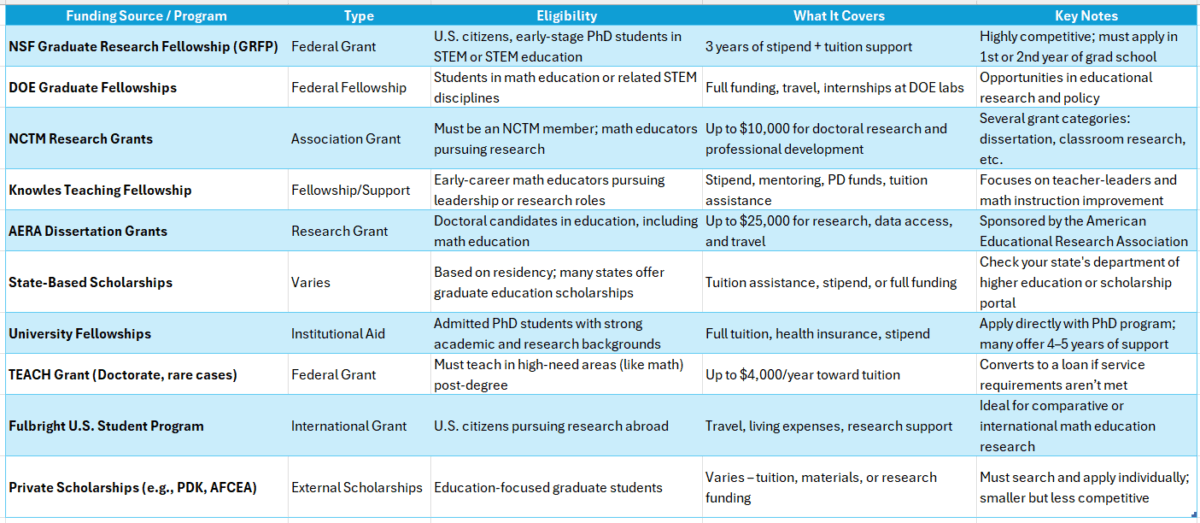Earning a doctorate in mathematics education is a significant step for those passionate about teaching math. But where should you pursue this advanced degree? Choosing the right institution can shape your career and influence your teaching methods. Let’s explore some top options!
Traditional Universities
Many well-known universities offer a doctorate in mathematics education. These programs often provide hands-on experiences and research opportunities. Some notable institutions include:
- University of California, Berkeley
- University of Michigan
- Harvard University
Online Programs
If flexibility is important to you, consider a doctorate in mathematics education online. These programs allow you to study from anywhere while balancing work and life. Look for accredited online institutions that offer robust support and resources.
Post Doctoral Opportunities
After earning your doctorate, you might explore post doctoral in education programs. These can enhance your expertise and open doors to advanced research positions. Always check for institutions that align with your career goals and interests.
Contact Now to Pursue Your Dream Degree From Your Nearest College
What to Look for in a Math Education Doctorate Program?
Choosing the right place to earn a doctorate in mathematics education is crucial for your future. It’s not just about the degree; it’s about finding a program that fits your needs and goals. A well-chosen program can open doors to exciting opportunities in teaching, research, and educational leadership.
Accreditation Matters
First, ensure the program is accredited. This means it meets high standards of education. An accredited doctorate in mathematics education will be recognized by employers and other institutions, making your degree more valuable.
Flexibility and Format
Consider whether you want a traditional or a doctorate in mathematics education online. Online programs offer flexibility, allowing you to study while working or managing other responsibilities. This can be a game-changer for busy professionals!
Faculty Expertise
Look into the faculty’s expertise. Are they experienced in mathematics education? A strong faculty can provide mentorship and guidance, enhancing your learning experience.
Top Online Programs for Earning a Doctorate in Mathematics Education
Earning a doctorate in mathematics education is a vital step for those dedicated to teaching and research. Finding the right program is essential, as it can significantly influence your career and skill development. Let’s look at some top online programs that make this journey both accessible and rewarding.
Several universities excel in offering online doctorates in mathematics education, providing flexibility and quality education. Here are a few standout options:
- University of Southern California: Renowned for its innovative curriculum and strong faculty support.
- Walden University: Features a comprehensive online program with a focus on practical applications in education.
- Capella University: Offers a flexible schedule and emphasizes research, making it ideal for those pursuing a post doctoral in education.
These programs equip students with essential knowledge and skills, emphasizing real-world applications and research. Graduates are well-prepared for leadership roles in education, making these online options a great gateway to a fulfilling career!
How to Choose Between Traditional and Online Doctorate Programs?
Choosing where to earn your doctorate in mathematics education is a big decision. With options like traditional and online programs, it’s important to find the right fit for your lifestyle and career goals. Each path offers unique benefits that can shape your educational journey.
Traditional Doctorate Programs
- In-Person Learning: Traditional programs often provide face-to-face interaction with professors and peers, fostering a collaborative learning environment.
- Structured Schedule: These programs usually have set class times, which can help keep you on track.
Online Doctorate Programs
- Flexibility: A doctorate in mathematics education online allows you to study at your own pace, making it easier to balance work and family commitments.
- Access to Resources: Many online programs offer a wealth of digital resources, including recorded lectures and online forums for discussion.
Ultimately, whether you choose a post doctoral in education or a doctorate in mathematics education online, consider your personal learning style and professional aspirations. This will help you make the best choice for your future.
The Benefits of Earning a Doctorate in Mathematics Education
Earning a doctorate in mathematics education can open many doors for educators and researchers alike. But where should you pursue this advanced degree? Understanding your options is crucial, as it can shape your career and impact your future students. Let’s explore the benefits of earning a doctorate in mathematics education.
Flexible Learning Options
Many universities now offer a doctorate in mathematics education online. This flexibility allows you to balance your studies with work or family commitments. You can learn at your own pace, making it easier to fit education into your busy life.
Career Advancement
A doctorate in mathematics education not only enhances your knowledge but also boosts your career prospects. With this degree, you can pursue roles such as a university professor, curriculum developer, or educational consultant. Additionally, a post doctoral in education can further refine your expertise and open even more opportunities.
What Career Opportunities Await with a Doctorate in Mathematics Education?
Earning a doctorate in mathematics education opens up a world of exciting career opportunities. Whether you’re interested in teaching, research, or leadership roles, this advanced degree can help you make a significant impact in the field of education. But where can you earn this prestigious degree?
With a doctorate in mathematics education, you can explore various paths, including:
- University Professor: Teach and inspire future educators at colleges or universities.
- Educational Researcher: Conduct studies that improve math teaching methods.
- Curriculum Developer: Create innovative math programs for schools.
- Educational Consultant: Advise schools on best practices in math education.
- Post Doctoral in Education: Engage in further research to deepen your expertise.
Additionally, many universities now offer a doctorate in mathematics education online, making it easier for busy professionals to pursue their dreams. With flexible schedules and accessible resources, you can balance work and study effectively. So, if you’re passionate about math education, consider taking the next step in your career!
How Long Does It Take to Earn a Doctorate in Mathematics Education?
Earning a doctorate in mathematics education is an exciting journey! It opens doors to advanced teaching roles and research opportunities. But how long does it take to complete this degree? Understanding the timeline can help you plan your educational path effectively.
Typically, a doctorate in mathematics education takes about 3 to 5 years to complete. This duration can vary based on whether you study full-time or part-time. Many programs offer flexibility, including a doctorate in mathematics education online, making it easier to balance work and study.
Factors Influencing Duration:
- Course Load: Full-time students usually finish faster than part-time students.
- Research Requirements: Completing a dissertation can extend your time in the program.
- Post Doctoral in Education: Some graduates pursue additional research opportunities, which can add to their timeline.
In summary, the journey to earning your doctorate is unique to you, but with dedication, you can achieve your goals!
Contact Now to Pursue Your Dream Degree From Your Nearest College
Funding Your Doctorate in Mathematics Education: Scholarships and Grants

Funding your doctorate in mathematics education can be daunting, but it doesn’t have to be! Finding financial support is essential for aspiring educators, allowing you to concentrate on your studies without the burden of debt.
Explore Your Options
- University Scholarships: Many universities offer scholarships for doctorate students in mathematics education. Check with your institution for details.
- Federal Grants: Investigate federal programs that assist education majors, which can significantly ease your financial load.
- Private Organizations: Various foundations provide scholarships for education-focused students. Research organizations that match your aspirations.
Tips for Success
- Apply Early: Many scholarships have early deadlines, so begin your applications promptly.
- Tailor Your Applications: Customize your essays to showcase your passion for mathematics education, as this can make a significant impact!
Additionally, pursuing a doctorate in mathematics education online may present unique funding opportunities, so be sure to explore those options. With determination and the right resources, you can achieve your educational goals!
Real-Life Success Stories: Graduates of Mathematics Education Doctorate Programs
Earning a doctorate in mathematics education can open doors to exciting career opportunities. But where should you pursue this advanced degree? Understanding the best programs can help you make an informed decision that aligns with your goals. Let’s explore some real-life success stories of graduates who have thrived after earning their doctorate in mathematics education.
Inspiring Alumni Stories
Many graduates of mathematics education doctorate programs have gone on to make significant impacts in their fields. For instance, Dr. Jane Smith, who completed her doctorate in mathematics education online, now leads a national curriculum development team. Her innovative teaching methods are reshaping how math is taught in schools across the country.
Benefits of a Doctorate in Mathematics Education
- Career Advancement: Graduates often find leadership roles in education.
- Research Opportunities: Many pursue post doctoral in education to contribute to academic research.
- Flexible Learning: Online programs allow for a balance between work and study, making it easier for busy professionals to earn their degree.
How CollegeDegree.Education Can Help You Find Your Ideal Math Education Doctorate Program
Choosing where to earn a math education doctorate is a big decision. It can shape your career and influence how you teach future generations. With so many options available, it’s essential to find a program that fits your needs and goals. That’s where CollegeDegree.Education comes in!
Explore Various Programs
At CollegeDegree.Education, you can explore a variety of doctorate in mathematics education programs. Whether you prefer a traditional campus setting or a more flexible doctorate in mathematics education online, we have options for you.
Compare Features and Benefits
We provide detailed comparisons of each program, including:
- Curriculum details
- Faculty expertise
- Online vs. on-campus options
- Financial aid opportunities
Get Expert Guidance
Additionally, our resources can help you understand the post doctoral in education paths available after earning your degree. With our guidance, you can confidently choose a program that aligns with your aspirations and lifestyle.
Contact Now to Pursue Your Dream Degree From Your Nearest College
FAQs
1. What is a Doctorate in Mathematics Education?
It’s a terminal degree that focuses on advanced study in math teaching, learning, curriculum development, and educational research, usually leading to roles in academia, leadership, or policy.
2. What are the main types of doctoral degrees in this field?
You’ll typically find two types: the Ph.D., which emphasizes research and theory, and the Ed.D., which focuses more on practical application in educational settings.
3. How long does it take to complete the program?
Most programs take 3 to 6 years, depending on full-time or part-time enrollment and dissertation progress.
4. What are the admission requirements?
Common requirements include a master’s degree (often in math or education), GRE scores (sometimes optional), letters of recommendation, and a statement of purpose.
5. What kind of coursework is involved?
Courses usually cover advanced math education theories, curriculum design, assessment methods, research methodology, and leadership in education.
6. Do I need teaching experience to apply?
Yes, many programs prefer or require applicants to have prior K–12 or college-level teaching experience in mathematics.


